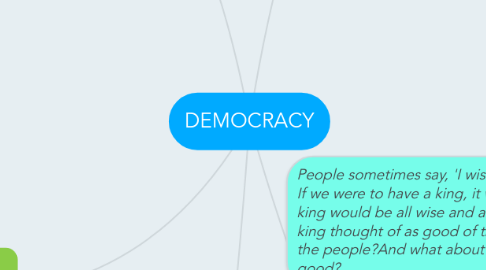
1. TIPS to use Mind Map
1.1. NOTES - Click on icon to read notes. If the note is long, scroll up and down or sideways.
1.2. ATTACHMENT - Click on icon for image preview. Click on the image to view enlarged image.
1.3. EXTERNAL LINK - Click on the arrow icon to visit an external website
2. Democracy does not ensure good governance. It ensures a 'platform' for good governance. A DEMOCRACY IS ONLY AS GOOD AS ITS PARTICIPANTS - You and me.
3. The fact you can express dissatisfaction with your democratic government is proof that democracy is better than other forms where expression of dissatisfaction may lead to punishments either mild(warning) or harsh (imprisonment, exile or even death).
4. Is democracy the perfect form of governance?
4.1. Speed
4.2. Accountability and Transparency
4.3. Legitimacy
4.4. Corruption
4.5. Economic growth
4.6. Economic Inequality
4.7. Social Diversity
4.8. Dignity and Freedom
5. Types
5.1. Representative
5.1.1. Criticism
5.1.1.1. Unrealistic & Inadequate
5.1.1.1.1. Theory
5.1.1.1.2. Reality
5.1.2. Why is a representative's judgement considered better than the peoples, to take a decision?
5.1.3. Systems of representative democracy
5.1.3.1. Parliamentary
5.1.3.2. Presidential
5.2. Direct/Participatory
5.2.1. Referendum/Plebiscite
5.2.1.1. It has been suggested in the past and in the present for Jammu and Kashmir. What do you think? Are there any other political situations in India for which you would suggest a referendum/plebiscite?
5.2.1.2. Important plebiscites in history
5.2.1.2.1. People in Saar deciding whether to become a part of France or Germany
5.2.1.2.2. People in Upper Silesia deciding which nation they wanted to join
5.2.1.2.3. Referendums by nations that decided self-rule after getting independence from colonisation
5.2.2. Initiative
5.2.3. Recall
5.3. Deliberative
5.4. Cosmopolitan
6. Classification
6.1. Procedural Democracy
6.1.1. Emphasis on
6.1.1.1. Procedures
6.1.1.2. Institutions
6.1.2. Disadvantages
6.2. Substantive Democracy
6.2.1. Emphasis on
6.2.1.1. Substance of policy making
6.2.2. Disadvantages
6.3. Procedural Versus Substantive Democracy: How India Fares. The Wire: Opinion
7. Definition
7.1. Democracy IS
7.1.1. Government by the people in which power is vested in the people and exercised directly by them or by their elected agents under a free electoral system
7.1.2. A form of government in which the whole people or some numerous portion of them exercise governmental power through deputies periodically elected by them - J.S.Mills
7.1.3. Government of the people, by the people, for the people - Abraham Lincoln.
7.1.4. Democracy & Freedom are not the same, but democracy can be seen as the "Institutionalization of Freedom"
7.1.5. Democracy IS NOT
7.1.5.1. Monarchy
7.1.5.1.1. Government led by a person usually selected by hereditary succession. Ex. King, queen, emperor.
7.1.5.2. Dictatorship
7.1.5.2.1. Government by a person or a small group of people who ensure through various mechanisms and suppression of basic liberties that their power remains strong. Probably have seized power by force.
7.1.5.3. Totalitariansim
7.1.5.3.1. A system of government that is centralized and requires complete subservience to the state, prohibits opposition parties, restricts individual opposition to the state and its claims, and exercises an extremely high degree of control over public and private life.
7.1.5.4. Oligarchy
7.1.5.4.1. Government by a 'few', power is vested in a small number of people - usually the wealthy, the royalty.
7.1.5.5. Theocracy
7.1.5.5.1. Government by religious authorities. Usually, repressive and intolerant of values that conflict with the dominant theology.
8. People sometimes say, 'I wish we had a king!' If we were to have a king, it would be on the assumption that the king would be all wise and all good. It would be about what the king thought of as good of the people. What about the wishes of the people?And what about his heir? Would he/she be just as good?
9. JUSTIFICATION - Why Democracy? Why not other forms of government?
9.1. Instrumental reasons
9.1.1. Basic Principles - Liberty & Equality
9.1.2. Public Opinion
9.1.3. Sovereignty of people
9.1.4. Fosters good competition
9.1.5. Political responsibility of citizens
9.2. Intrinsic reasons
9.2.1. Moral superiority
9.2.2. Majority Rule
9.2.3. Minority rights
9.2.4. Rule of law is superior
9.2.5. Protection of constitution
9.2.6. Justice
9.2.7. Political Equality
